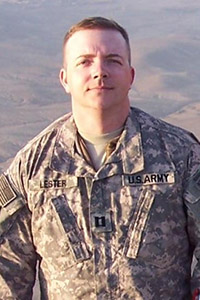Being a member of the U.S. Army can be stressful. Major Paul Lester, who received his Ph.D. from the College of Business Administration, is now working with CBA researchers to help evaluate new strategies to increase the overall health of members of the army through a program called Comprehensive Soldier Fitness.
“For the first time in the history of the army, the senior leadership wanted to place an equal emphasis on psychological health as it places on physical health,” Lester said. “The point of psychological fitness is to develop health and resilience across the broader army community -- that includes soldiers, their family members and the army civilian work force. We’re talking in excess of two million people.”
The army contracted with TKC Global to manage Comprehensive Soldier Fitness, who in turn partnered with CBA to conduct the evaluation of the program. Lester believes that the reputation CBA has for excellence in research, along with the great value it provides, has benefited all involved.

Major Paul Lester
“CBA has come up with a program evaluation initiative that has produced three technical reports outlining the program’s effectiveness, and it appears based on the analysis that the program is working,” Lester said.
Dr. Peter Harms, assistant professor of management; Dr. Dina Krasikova, post-doctoral research associate and Dr. Mitch Herian, a research analyst, have all been involved in evaluating the Comprehensive Soldier Fitness program.
“Comprehensive Soldier Fitness is conducting a number of training programs designed to increase the resilience of soldiers,” Herian said. “They try to improve a soldier’s emotional health, physical health, family relationships and social relationships through various training mechanisms.”
Krasikova emphasized that offsetting the negative effects of post-traumatic stress disorder (PTSD) is a major goal of the evaluation process.
“We have a number of areas that evaluate psychological fitness in terms of the ability to regulate emotions effectively,” Krasikova said. “That includes things such as learning how to develop strong ties with friends and family, and having a purposeful life. It all helps soldiers avoid health problems such as drug abuse, alcohol abuse, PTSD depression and anxiety. It also helps the army keep and retain soldiers.”
The research has shown that people who are more emotionally healthy are more likely to get promoted and to receive awards, which in turn helps with retention.
“These are all things that you would expect to show up, but until you do the data analysis and find the statistical relationships you don’t know for sure,” Herian said. “We’ve been able to validate that people that are more emotionally fit have better outcomes.”
The CBA research team is currently working on their fourth technical report, and presented their findings at the Academy of Management meeting in Boston, Mass., last summer.
Published: January 7, 2013